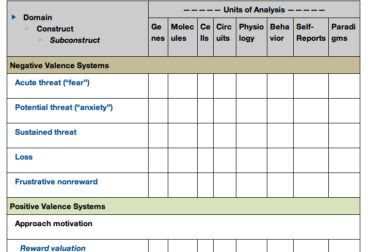Some in the blogosphere are wondering about the evolutionary origin of shyness. Why are some people shy and others not? Is there an evolutionary benefit? Maybe it’s a “spandrel” (that is, a by-product of another fitness-making trait).
One study I read somewhere said that shy people as kids have over-active pre-frontal cortexes, which caused them to find it difficult to get out of their own heads. This is a sort of flattering explanation of shyness — shy people are just smarter!
Another explanation is that as social morays came to be more complex there came to be some people who would wonder when they were acting acceptably and this might trip them up from acting at all. Joe Moran writes:
Until a few hundred years ago, life was lived far more in public. For example, it was quite normal for people to urinate or defecate in public places. Even in private houses, whole families would eat, sleep and socialise together in the same room. Then, gradually, bodily functions and aggressive language and behaviour were rendered increasingly invisible in polite society, thanks to what the late sociologist Norbert Elias called the ‘civilising process’ that took place in the Western world from the 16th century onwards. As greater physical and psychological boundaries grew up around individuals, particularly among relative strangers in public, there were more opportunities for awkwardness and embarrassment about when these boundaries should be crossed.
Is that it? That would suggest that at one time there were fewer shy people than there are now. That’s an empirical question but I’m not sure how well it lends itself to scientific research methods.
Another explanation is due to Dr. Zimbardo, author of the Stanford Prison Experiment.
Zimbardo began thinking of shy people as incarcerating themselves in a silent prison, in which they also acted as their own guards, setting severe constraints on their speech and behaviour that were self-imposed although they felt involuntary.
That seems undermotivated. He is just arguing from analogy. It’s a hypothesis without yet any reason to believe it other than it would explain the phenomenon.
Here’s another question. Are we correct to treat shyness as a pathology?
Extreme shyness was redefined as ‘social anxiety disorder’, and drugs such as Seroxat (also known as Paxil), which works like Prozac by increasing the brain’s levels of serotonin, were developed to treat it. As Christopher Lane argues forcefully in his book Shyness: How Normal Behaviour Became a Sickness (2007), this was part of a more general biomedical turn in psychiatry, with its ‘growing consensus that traits once attributed to mavericks, sceptics, or mere introverts are psychiatric disorders that drugs should eliminate’
Another more philosophical issue would be the careful definition of shyness, so we can know what we are talking about. To this end, some are careful to say that introversion is not the same as shyness. Introversion means you get tired out by social stimulation. This is apparently not regarded as pathological. Shyness on the other hand is “a longing for connection with other people which is foiled by fear and awkwardness,” Moran writes.
Moran consider whether or not he believes,
that lots of voluble people do not really listen to each other, that they simply exchange words as though they were pinging them over a tennis net — conducting their social life entirely on its surface. A small, self-regarding part of me thinks there is something glib about easy articulacy and social skill.
If you are shy, it’s worth thinking about just what that means, its origins, and whether or not it’s such a bad thing.





